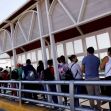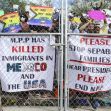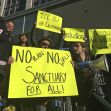The Trump administration had issued a rule that penalized lawful immigrants for seeking public assistance. Last week, the Supreme Court dismissed several pending appeals over that rule pursuant to joint requests filed by the Biden administration and plaintiffs that challenged that policy. Acting Solicitor General Elizabeth Prelogar told the justices in a brief letter on Tuesday, March 9, 2021, that both sides agreed the challenge should be dismissed.
Prelogar’s request came under Supreme Court Rule 46.1. This rule instructs the clerk of the Supreme Court to dismiss the case when all sides agree, without requiring the permission of the justices. Scott Harris, clerk of the court, did so quickly.
The Justice Department didn’t comment after the filings were docketed. Immigrants rights groups said the filings were beginning steps in rescinding the public-charge policy still in place. Legal Aid Society staff attorney Susan Welber said the filing means that the Trump-era rule will “now be blocked while the Biden administration continues its review process and decides what the new [rule] will be.”
San Francisco City Attorney Dennis Herrera, one of several officials who sued to block the Trump administration policy, said, “This case is over, and this victory means the American Dream is alive and well. The previous administration’s attempt to impose a wealth test on immigrants who came here legally was bad for our economy, bad for public health and bad for our country.”
Other groups that also sued the Trump administration believe the rule will no longer be enforced. A statement from Make the Road New York, the African Services Committee, Catholic Charities Community Services, the Asian American Federation and the Catholic Legal Immigration Network said, “Immigrant families can now access lifesaving healthcare, food and housing assistance for which they are eligible without fear that they will lose the chance to obtain lawful permanent residence.”
Biden issued an executive order that demanded an immediate review of the Trump-era rule, saying his administration “should consider and evaluate” the effects of the rule. His administration is to recommend steps to be taken by agencies “to clearly communicate current public charge policies and proposed changes, if any, to reduce fear and confusion among impacted communities.”
“Public charge rules,” which disqualify noncitizens who rely significantly on welfare programs from getting legal residence, were tightened in August of 2019. Not only immigrant organizations, but several state and local governments, including the city of San Francisco, Cook County, Illinois, and New York State, sued to block the public-charge criteria. Their argument was that the restrictions exceeded Congressional authorization.
Though Connecticut, New York and Vermont objected, claiming that discouraging immigrants from getting healthcare could aggravate the pandemic, the Supreme Court allowed the stricter criteria to go into effect last year.
Since the Immigration Act of 1882, federal law has disqualified those coming into the country who were expected to be “public charges,” that is, unable to support themselves, and prevent them from becoming a burden to the taxpayers. The disqualification was applied to individuals who were largely dependent upon the government for a long period or those who would be a “public charge.” This definition counts only cash benefits, such as Supplemental Security Income from Social Security or Temporary Assistance for Needy Families.
The Trump administration expanded the reach of that definition by adding more benefit programs. The Trump definition included those who received benefits like Medicaid, housing assistance or food stamps for a total of 12 months in a 36-month period. After this change was made, then-acting Director of US Citizenship and Immigration Services, Ken Cuccinelli, defended the rule, and revised the Statute of Liberty’s pedestal poem like this: “Give me your tired and your poor who can stand on their own two feet and who will not become a public charge.”
The Legal Aid Society, along with other groups, publicly approved of Biden’s actions. A statement they issued said, “The Trump rule erected an invisible wall in the form of a wealth test that discriminated against people on the basis of race as a condition for regularizing their immigration status.” The statement went on to say, “And because of the public charge rule, immigrant families have been living in fear of using essential benefits like healthcare, despite serving as frontline workers who have been among those hardest hit by COVID-19.”
The statement continued, “The Biden administration has rightfully withdrawn the government appeals of appellate court decisions enjoining the Trump DHS’s public charge rule, clearing the way at last for this unlawful rule to no longer be enforced. Immigrant families can now access life-saving health care, food, and housing assistance for which they are eligible without fear that they will lose the chance to obtain lawful permanent residence, because the actions today mean that the harmful public charge rule will again be blocked.”






